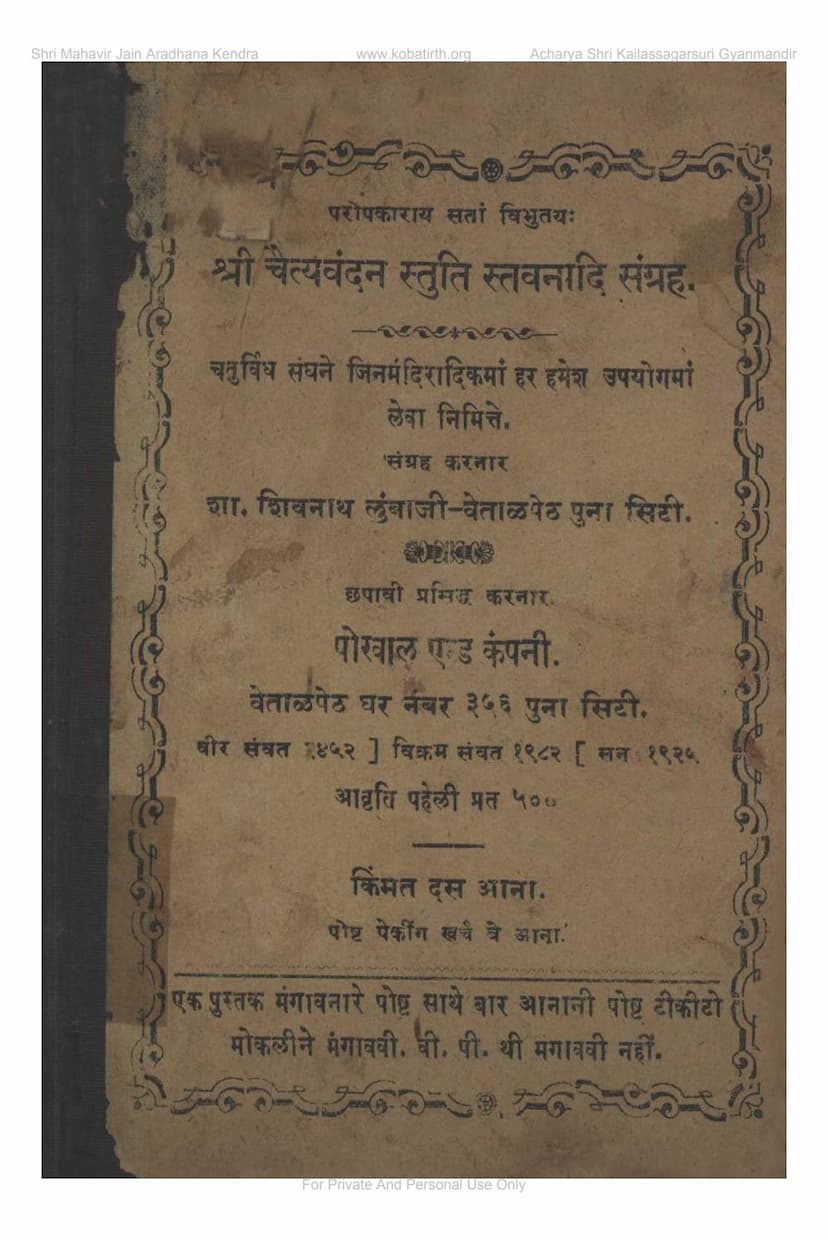Chaityavandan Stuti Stavanadi Sangraha Part 02
Added to library: September 1, 2025

Summary
Here is a comprehensive summary of the Jain text "Chaityavandan Stuti Stavanadi Sangraha Part 02" by Shivnath Lumbaji, published by Porwal and Company, based on the provided pages:
Overview:
This book, "Chaityavandan Stuti Stavanadi Sangraha Part 02," is a collection of prayers, hymns (Stuti), and devotional songs (Stavan) primarily intended for use during Jain worship and rituals. The preface highlights the increasing importance of books in disseminating knowledge and acknowledges that the collection comprises both ancient and modern compositions, drawing from manuscripts and existing publications. The compiler, Sh. Shivnath Lumbaji, aimed to make these valuable spiritual texts accessible to the Chaturvidh Sangh (the fourfold Jain community: monks, nuns, male devotees, and female devotees). The publisher, Porwal and Company, released the first edition of 500 copies in Vikram Samvat 1982 (1925 CE), costing ten annas with an additional two annas for postage and packing.
Key Features and Content:
- Purpose: To provide the Jain community with a comprehensive resource for Chaityavandan (worship of the temple and idols), Stuti (praise), and Stavan (devotional songs), ensuring regular engagement with Jinmandirs (Jain temples) and related practices.
- Compilation: The book is a compilation, drawing from various sources. Some texts are from handwritten manuscripts, which might contain inaccuracies due to their origin. The compilers acknowledge potential errors from printing or proofreading and encourage readers to correct them and inform the publishers for future editions.
- Structure (Table of Contents): The extensive table of contents reveals the book's organized approach, categorizing the devotional content:
- Chaityavandan: Dedicated sections for each of the 24 Tirthankaras, with multiple Chaityavandans for some. It also includes Chaityavandans for the 24 Tirthankaras collectively, Mandhar Swami, various pilgrimage sites (Siddhachalji, Girnarji, Panch Tirth), festivals (Diwali, Paryushan), and specific divine manifestations (Siddha Bhagwan, Viryaman Jin). There are also general Jin Chaityavandans, Jin Pujas, and sections on the five great knowledge types (Mati, Shruta, Avadhi, Manahparyav, Keval Gyan).
- Stuti (Dhoj): Divided into two sections: those with multiple verses and those with a single verse. These also focus on various Tirthankaras, festivals, and knowledge types.
- Stavan: A substantial collection featuring Tirthankara Stavans by renowned poets like Ratnavijayji and Yashovijayji, as well as a selection of Stavans from various other poets.
- Chhand (Verses): Includes descriptive verses on themes like the Thousand Names of Jin, prayers to Shanti Jin, Tirthankara descriptions, and the Navkar mantra.
- Parchuran Vishay (Miscellaneous Topics): Covers various devotional themes, including morning meditations, rituals, Aarti, Mangal (auspicious songs), and a section on book advertisements.
- Content Examples (from early pages): The initial pages showcase Chaityavandans for Shri Rishabhdevji (Adinath), Shri Ajitnathji, Shri Sambhavnathji, Shri Abhinandananji, Shri Sumatinathji, Shri Padmaprabhuji, Shri Suparshvanathji, and Shri Chandprabhuji, among others. These often include details about their lineage, lifespan, characteristic symbols (Lanchhan), birthplaces, and key life events.
- Poetic Style: The language is primarily in Gujarati, employing poetic meter and devotional fervor. The Stavans, in particular, are set to various traditional tunes and melodies.
- Historical Context: The publication date (1925 CE / VS 1982) places it in an era where Jain religious literature was actively being compiled and disseminated. The emphasis on accessible pricing and clear ordering instructions (no VP) reflects the publishing practices of the time.
In Essence:
"Chaityavandan Stuti Stavanadi Sangraha Part 02" is a foundational text for Jain devotional practice. It systematically organizes and presents a rich collection of prayers and hymns dedicated to the Tirthankaras and core Jain principles. The work reflects a deep commitment to preserving and propagating Jain spiritual heritage for the benefit of the community, with an explicit aim to foster regular engagement with the sacred sites and teachings of Jainism. The compilers' and publishers' efforts aimed to make these profound spiritual resources available to a wider audience.